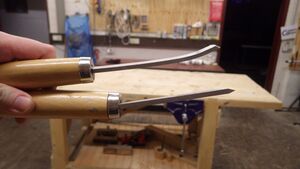Woodturning Introduction: Difference between revisions
→Demonstration: avoid damage by dropping tools |
NitramLegov (talk | contribs) Tutor logic change |
||
| Line 1: | Line 1: | ||
This is the content required for an introduction to our [[Wood Lathes|wood lathes]] and [[Woodturning Tools|woodturning tools]] - '''reading this does NOT replace the mandatory session with a [[tutor]]!''' It will make it a lot quicker though ;-) | This is the content required for an introduction to our [[Introduction for::Wood Lathes|wood lathes]] and [[Woodturning Tools|woodturning tools]] - '''reading this does NOT replace the mandatory session with a [[tutor]]!''' It will make it a lot quicker though ;-) | ||
If you need this introduction, please reach out to the following tutors: [[Tutor::User:Lukas|Lukas]] | |||
Let's begin! First off, make sure you have read the respective machine's manual ([https://www.guede.com/sys/dl/00501_ml.pdf Güde 1000], [http://download.maschinenhandel-gronau.de/MANUAL_D_460_460F_DE.pdf Holzmann D 460F]) and have '''watched at least one of these videos''' explaining how catches ''("Nürnberger")'' happen: | Let's begin! First off, make sure you have read the respective machine's manual ([https://www.guede.com/sys/dl/00501_ml.pdf Güde 1000], [http://download.maschinenhandel-gronau.de/MANUAL_D_460_460F_DE.pdf Holzmann D 460F]) and have '''watched at least one of these videos''' explaining how catches ''("Nürnberger")'' happen: | ||
Revision as of 22:39, 24 January 2022
This is the content required for an introduction to our wood lathes and woodturning tools - reading this does NOT replace the mandatory session with a tutor! It will make it a lot quicker though ;-)
If you need this introduction, please reach out to the following tutors: Lukas
Let's begin! First off, make sure you have read the respective machine's manual (Güde 1000, Holzmann D 460F) and have watched at least one of these videos explaining how catches ("Nürnberger") happen:
Safety
Depending on your tool and material, you may also need to wear a dust mask.
| Dangers | Precautions |
|---|---|
quickly spinning exposed chuck and workpiece
|
|
| do NOT wear gloves, loose jewellery or clothing or open long hair! | |
| tools, especially skew chisels, can get caught on the workpiece's surface (leading to a catch or runback) |
|
| parting tools can get stuck in the cut due to the high friction | keep the tool straight and make cuts wider than the tool whenever you go deeper than a few mm |
| flying shavings, splinters and dust |
|
| Güde 1000: belt-based speed selection | unplug the machine before opening the belt housing to select a different speed |
Suggested Reading
Besides these safety notes, you should read our page on woodturning tools.
You really should! Damaged tools are your responsibility to replace and can get quite expensive...

Demonstration
The tutor will show you these steps in detail:
- speed selection
- unplug the lathe
- open the belt housing on the left
- loosen the red screws holding the motor in place (just a little bit, do NOT remove them!)
- lift the motor up to get some slack in the belt
- switch the belt to the desired setup (same position on both pulleys!)
- let the motor go back into its original position and re-tighten the holding screws
- leave the belt a bit looser than you would on the drill press - that way, it can slip when an accident happens!
- setting up a workpiece between centers ("spindle work")
- find the center point and mark it on both sides
- remove the drive center from the headstock, set it on the center point you marked on your workpiece, and hammer it "in"
- in case of hardwood, a few relief cuts across the center point may prevent splitting
- this may also reduce the need for hammering the drive center into the workpiece
- screw the drive center back onto the headstock spindle and move the tailstock as close as the workpiece allows
- drive the tailstock spindle into the workpiece and secure it with the nuts on either side of the tailstock
- keeping the workbench tidy - if a woodturning tool falls down, it will almost certainly damage its edge...
- the wall holder is the best place for anything you don't need in the current step!
- do not put the currently used tools down parallel to the edge of the table, they will fall eventually...
- letting the bevel of a gouge "ride" on the workpiece before the cut
- cutting a shaving with the skew chisel: let the bevel ride and keep the contact point with 1/3 of the blade below and 2/3 above (should already work if the workpiece is rotated by hand, otherwise something is wrong!)
- cutting "downhill" when sculpting features on spindles
Waiting List
This introduction takes longer than many others and usually can't be done spontaneously during regular opening times. If you would like to receive it, please add yourself to >> this list << and we will find a good time once a few members are on it!


